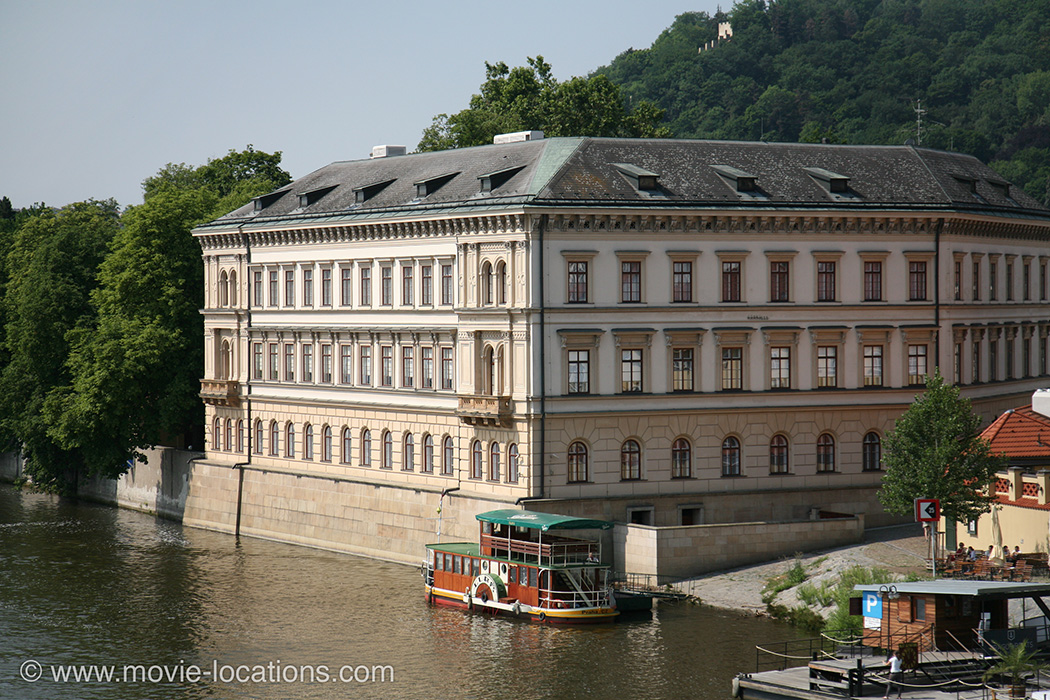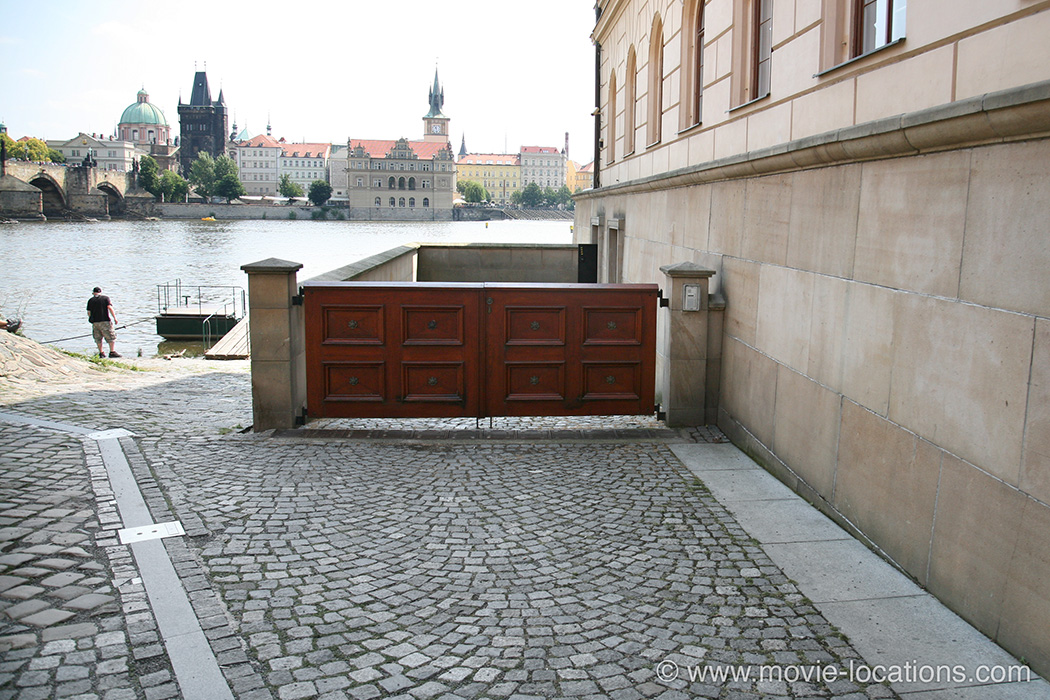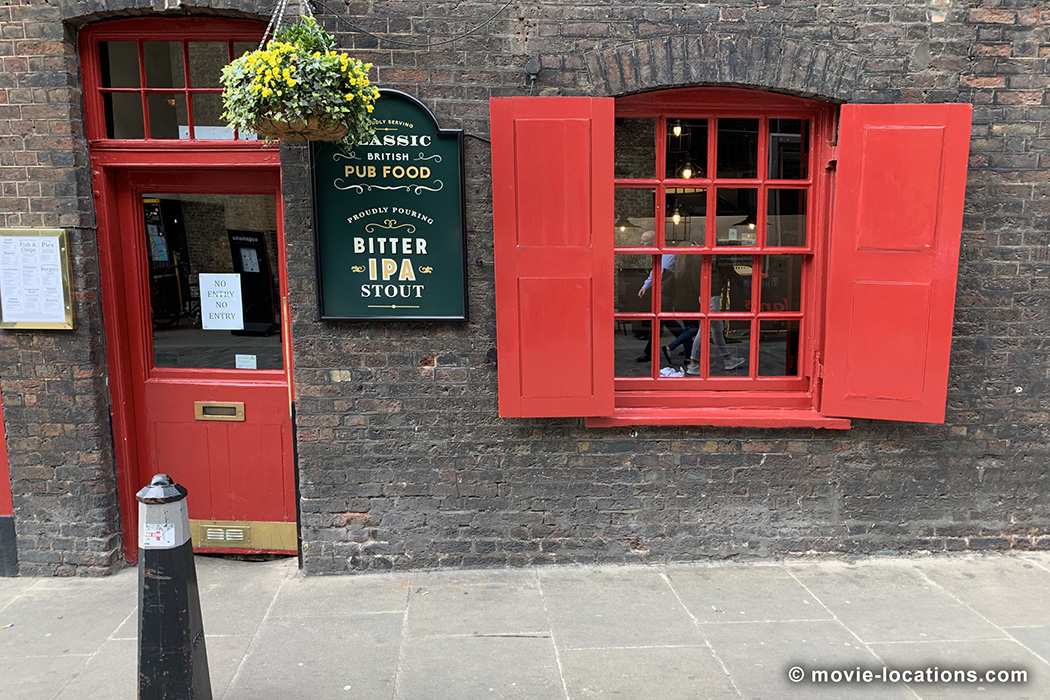Mission: Impossible | 1996


- Locations |
- London;
- Prague, Czech Republic;
- Scotland;
- Virginia
- DIRECTOR |
- Brian De Palma
Discover where the first Mission: Impossible movie (1996) was filmed, around Prague in the Czech Republic; London; Scotland; and briefly in the USA, Virginia.
It doesn’t matter that this breathless adventure hardly pauses to make sense with kinetic director Brian De Palma pulling out all the stops, and then some.
The film was shot mainly in Prague and London.
The ‘embassy’, where the doomed first operation begins, is the usual mixture of locations, outside and inside.

The exterior, not really seen in long-shot, is the Liechtenstein Palace, Malostranské námestí 13 on Kampa Island on the bank of the River Vltava, one of two palaces in the city that once belonged to the House of Liechtenstein (the family which gave its name to the principality). Restored in the 1980s, the palace houses luxurious apartments and is currently used by the Czech Government.
You'll hardly be able to tell that Kampa is an island – artificially constructed, it's separated from Malá Strana (the Lesser Town) by nothing more than a millstream known as Čertovka.

The grand interior of the 'Embassy', though, is the then-rather rundown Národní Muzeum, Natural History Museum, Václavské námestí 68 in Prague. The museum has been closed for several years for major renovations, no doubt helped by the locations fees earned by its appearances as the lobby of a grand ‘Venetian’ hotel in 2006's Casino Royale and as the 'art gallery' in the Hughes Brothers' From Hell, with Johnny Depp.

Back at the Kampa Island exterior location, on the northern side of the Liechtenstein Palace, just off Na Kampe, you can see the wooden doors through which the agent manages to make his unexpected exit.

If you continue north on the riverside walk you can see the, now rather rundown and overgrown, wooden gate at which Sarah Davies (Kristin Scott Thomas) meets a sudden and shocking end.

As it becomes clear the team is under attack, the car explodes on Na Kampe itself. The whole area is overlooked by the famous Karluv Most (Charles Bridge), from which Jim Phelps (Jon Voight) plunges into the Vltava.
The 15th Century stone Bridge, connecting Malá Strana with Staré Mesto (the Old Town) and therefore usually jam-packed with tourists and all kinds of street vendors and artists, is punctuated by 30 striking 18th Century statues of saints (now replaced by replicas). The Bridge can also be seen in Rob Cohen's XXX, in Van Helsing and in Spider-Man: Far From Home.

At the northern end of Na Kampe you'll find the double flight of steps up which Ethan Hunt (Tom Cruise) rushes to try to get to Phelps.
The glass-fronted Art Nouveau restaurant, in which Hunt meets up with his control Kittridge (Henry Czerny) and realises the whole set-up was a mole hunt and he's now the prime suspect, was built back at the studio. It's supposedly on Staroměstské námestí, the Old Town Square, across which Hunt escapes after blowing out the front of the restaurant.

Following his own investigations, he's invited to an assignation with the mysterious Max on a bench on main shopping street Na Prikope at Nekazanka in the New Town (there is no bench, by the way).
He's blindfolded and whisked off to meet Max (Vanessa Redgrave) in a superb art nouveau apartment. Once again, two locations are used.

The interior is the historic Hotel Europa, Václavské námestí 25. The magnificent landmark hotel is unbelievably shuttered and boarded up, though you can see its extravagant frontage dominating Wenceslas Square.

The canopied entrance seen in the film is U Prasne Brany 2, a part of the grand Municipal House complex (which houses the French restaurant seen in XXX).

The balcony on which Max's henchman stands guard is a little further south of the entrance on U Prasne Brany, alongside the landmark Powder Tower, the Gothic city gate.
The exterior of the CIA Building in Langley, Virginia is the real thing, but the interior is the old London County Hall, at the foot of Westminster Bridge, across from the Houses of Parliament.
County Hall was home to the GLC (Greater London Council) until this was abolished by Prime Minister Margaret Thatcher in 1986. Today County Hall houses an array of businesses and tourist attractions, including the London Sea Life Aquarium (featured in Mike Nichols' Closer), the London Dungeon and the Namco Funscape amusement arcade. The London Eye is next to County Hall, and its visitor centre is inside the building. County Hall provided the entrance to the hi-rise apartment of Frank D’Amico (Mark Strong) in Matthew Vaughn's 2010 Kick-Ass, the auction room in Danny Boyle's Trance, while its terrace is featured in the opening scenes of Alfred Hitchcock's 1972 Frenzy.
The London safe house in which Ethan Hunt (Tom Cruise) and Franz Krieger (Jean Reno) hole up, is above Liverpool Street underground station, Liverpool Street at Broad Street, EC2, and Hunt meets up with Phelps nearby, on Liverpool Street Railway Station, mightily revamped since its dilapidated appearance in David Lynch’s The Elephant Man. The row of telephones, where Hunt and Phelps meet, has been replaced by cashpoint machines.

The supposedly ‘cross-channel’ railway climax, which so infuriated train buffs, were filmed in Scotland, on stretches of line between Annan and Dumfries, and Dumfries and New Cumnock.
The terrace pub, where Ethan finally unwinds, is the Anchor Tavern, Bankside on London’s south bank by Southwark Bridge. A historic area of the city – nearby are Tate Modern (formerly the Bankside Power Station) and the re-creation of Shakespeare’s Globe theatre, the culmination of years of campaigning by the late actor and director Sam Wanamaker.

In Shakespeare’s day, Southwark, then outside the bounds of the city, was the red-light and entertainment district. Brothels, taverns, bear-baiting and cockfighting flourished, along with the new-fangled entertainment form that marked the end of civilised values – the theatre. Apart from the rebuilt Globe, you can view the remains of The Rose, a genuine Elizabethan playhouse, where Shakespeare’s earliest plays were performed.
In 1666, an exhausted Samuel Pepys watched resignedly from the Anchor as the Great Fire of London consumed the city across the river.





